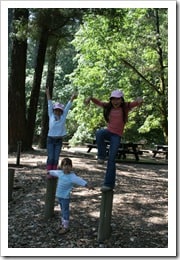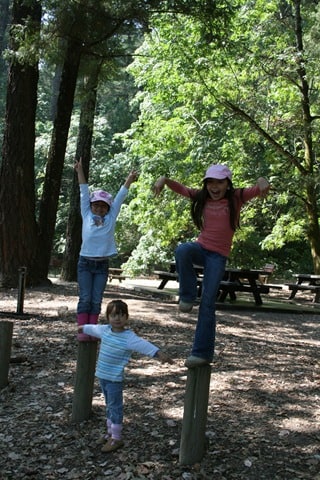
So in order to maintain some type of order within our household (the big, cracked wooden spoon still holds some threatening power though), I decided to come up with my OWN Naughty or Nice list. I told my kids that I would evaluate them at the end of each day and then give each of them individually either a “plus” (if they were good), a “check” (if they were OK) or a “minus” (if they were bad). I haven’t figured out what they get in the end…I had threatened to take away their presents so maybe I will say that based on their score, they will get their presents or not.
I happily drew the grid on our whiteboard on the fridge, with careful columns for each child and rows for each day remaining until Christmas. And then I filled it out based on their behavior that night prior to going to bed. And then I started thinking and it dawned on me that I had made a HUGE MISTAKE!
I was promoting a competitive environment between my children. Just a few weeks prior, my wife got mad at me for doing the same type of competition with my statement to my girls: “Let’s see who can get ready and in bed the first!” I must admit, it worked really well the first time. But the next time, there were emotional breakdowns by the ones running more slowly, accusations at me for helping our youngest, barely brushed teeth, you get the picture. It wasn’t pretty. And, I was severely chastised by my wife about this. Lesson learned, or so I thought.
So, with the concerns about encouraging sibling rivalry instead of comradery buzzing in my head, I decided to talk to my wife about the Naughty or Nice list that I had come up with. The intensions regarding the list were good, at least I thought they were. My kids, who are always trying to please, would be encouraged to do “good” instead of “evil.” But then my wife and I spoke and she explained her ideas and what she does to encourage teamwork between our daughters. She is the expert. She is the one that has to deal with the “getting ready for school” chaos that ensues every morning. And she has a strategy that seems to work.
As my wife lays it out, if one kid is late getting ready for school, EVERYONE is late, and they, on their own, have to go to the principal’s office together to explain it. But it isn’t just with the daily school preparedness drills. She strongly discourages any type of competitiveness between them. Of course, if one child is particularly unruly, they will disciplined as appropriate. But through encouraging that they need to work together and stick up for each other, they build a tighter bond between each other. A measurement of this successful teaching would be if one of us (parents) are scolding one of our children, that the other ones would jump in to defend their peer.
She puts it a different way as well: if there ARE going to be divisions or “teams” within the family, it has to be between parents and children and not between all of the individuals. My wife and I know that there will be huge battles to be fought in the future, but we want them to be 1 team against 1 team. While it is complicated (there is always one parent who is weaker or a bit looser in terms of discipline vs. fun), it is important to build these team relationships (parent & parent and child & child) and then work together to overcome whatever obstacles come our way.
The idea of teamwork between siblings is particularly important if those siblings are girls. We have 3 (pre-K, 1st grade and 4th grade). With girls, Relational Aggression (a subject for a series of separate articles) is a dangerous and very “clear and present danger” with today’s child, even more so with advances in technology (social media, cell phone texting, etc.). I won’t go into the details of that, but I do want to explain how teamwork plays an important role in meeting this problem head-on. Chances are, your children will be subject to one form of relational aggression or another during their school years. It is inevitable. There is little you can do to prevent it. What you can do it give your children tools to help them combat it, or, at a minimum, deflect it. If your children are close enough in age (mine are 2.5 years apart), they will interact with each other at school. If their sibling team is strong enough, this will work to their advantage in terms of confronting any aggression that they may encounter. If they have a solid team, they will defend each other. It doesn’t matter who it is doing the defending, as long as they are looking out for each other. If you haven’t been promoting teamwork at home, chances are, there won’t be any teamwork between them at school.
Also, friends come and go. After a while, some will stick and become life-long friends, however, others will move along with time. At home, we try to also drive this point, but add to it the idea that they are each others’ best friends. We now simply ask them, “who is your best friend?” They usually respond with a list of people at school or someone else. We then prompt them, “but who REALLY is your best friend?” They now respond with “my sisters.” We are encouraged that they are learning.
My discussion with my wife was eye-opening. This morning, before my kids woke up, I went out to our whiteboard that had the checklist and erased all of the names and columns and wrote in “N.A.S. Team” (for their initials) and gave them a team grade. While I expect them to understand this, I will explain why I changed it tonight over dinner.
HTD Says: Do try to encourage teamwork among your children. It can help them build their individual and group strength!



1 comment
gutter cleaning service
This is so interested! Where can I find more like this?